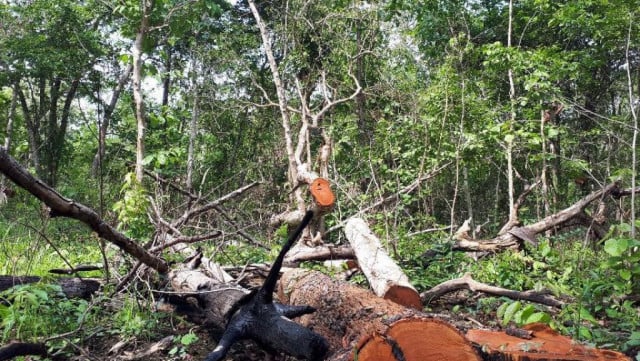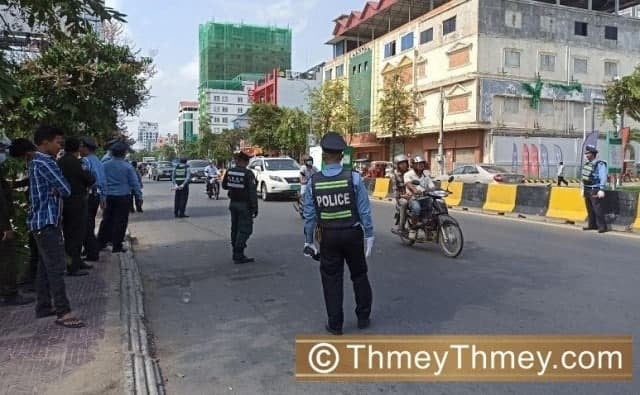Prey Lang Community Network voices great concern over rapid increase of illegal logging

- Thmey Thmey
- June 18, 2019 1:52 PM
Spokesman for Ministry of Environment says the report has political agenda
PHNOM PENH--Illegal logging activities in the Prey Lang Wildlife Sanctuary have dramatically increased as the local authorities failed to act and kept on taking bribes from the loggers, an alliance of forest monitoring communities said Monday in the statement.
According to the Prey Lang Community Network (PLCN), which monitors activity in the sanctuary that spreads over four provinces—Kratie, Stung Treng, Preah Vihear and Kompong Thom—timber was illegally transported on a daily basis, bypassing forest-ranger checkpoints; a sawmill was built and used by Think Biotech (Cambodia) Co. Ltd.; mining operations contributed to deforestation; and the authorities allowed newcomers to the area to cut trees to build homes.
The NGO statement also mentions that, with the cooperation of forest rangers and the local authorities, 98 chainsaws were confiscated compared to 66 in 2017. The number of confiscated home-made guns and traps also went up in 2018 compared to 2017.
The sanctuary was created in May 2016 when Prime Minister Hun Sen signed a sub-decree turning 4,320,000 square kilometers of Prey Lang into a wildlife sanctuary.
Chheang Ly, the PLCN representative based in Stung Treng, told Thmey Thmey Tuesday that one factor contributing to the increase of illegal logging activities last year was some local authority members taking bribes and turning a blind eye.
“In previous years, [illegal] logging didn’t increase, but it is increasing now,” Ly said.
It has also become more difficult for her community to obtain the cooperation of local authorities for cooperation to combat illegal logging, Ly said. “Before it was fine. But lately, we have had difficulty to request [cooperation] from local rangers and the authorities for cooperation to protect the forest.
“We urge the government to take action, following up and inspecting the rangers in order to address this issue,” she said.
However, Net Pheaktra, the Ministry of Environment spokesman, dismissed the information contained in the PLCN report regarding illegal logging increase and especially the inaction and misconduct of the local authorities and rangers to handle the situation.
He described those claims as politically motivated and meant to disvalue the government’s efforts to protect the forest.
“I can confirm that illegal logging activities have not increased,” Pheaktra told Thmey Thmey. “The report from the PLCN doesn’t stand on reality, but only manipulates data and has a political agenda that aims to generate public confusion and disvalue the hard work carried out by our ministry and our rangers in preserving natural resources.”
When asked about PLCN pointing out the lack of cooperation from the local authorities, Pheaktra responded that the authorities had always been ready to cooperate with all NOG partners and communities in conducting forest patrol operations.
“We are always ready to cooperate, but they should notify the authorities in advance [before conducting patrols, even though it’s not required by law] because all operations can potentially involve confrontation with those loggers who are armed: It is very dangerous,” he said.
On the issue of bribery happening among rangers and local authorities, Pheaktra said that the ministry was open to receiving any evidence from anyone who had witnessed misconduct.
“We have heard about this information. But they should report the issue to the ministry with evidence. Then we can take actions to investigate and inspect the issue involving our authorities,” Pheaktra said.
He then called on all forest protection NGOs to work together to preserve the forests, acknowledging that small-scale illegal logging still takes place.
While agreeing with the ministry’s spokesman that big-scale deforestation had been prevented, an environmentalist deplored the fact that Pheaktra had dismissed the report of the Prey Lang Community Network.
That report was based on accurate data collected through a monitoring application and then analyzed by researchers, said Sar Mory, co-founder and vice-president of the Cambodian Youth Network (CYN).
“When the ministry dismisses the report, I think, they should know that the report was compiled based on data collection through digital application,” Mory said. “They record all illegal logging activities every time it occurs. And they have video recordings, photos, and GPS coordinates.
“If the ministry doesn’t agree that the deforestation increases, they can go monitor with the local communities and NGOs,” Mory said, adding that he would appreciate the ministry cooperating and taking swift action to strictly monitor local staff and rangers as they conduct their work.
Mory also pointed out that, if logging has not increased as the ministry’s spokesman claimed, why has timber been transported day and night out the protected areas.















